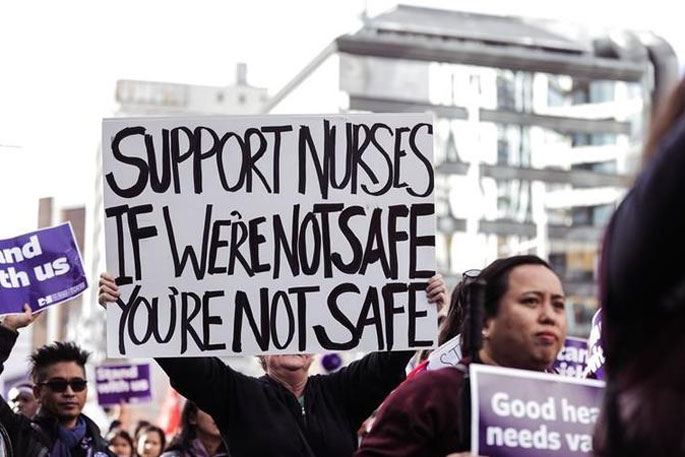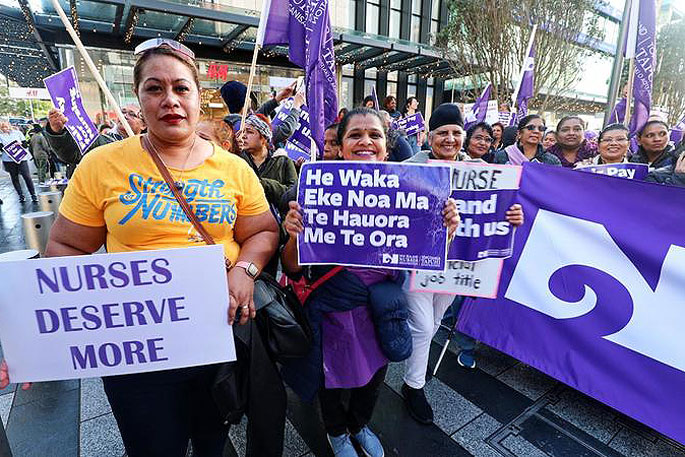The nurses and midwives' union and district health boards will be discussing where to from here after failed pay negotiations led to a strike yesterday.
Thousands took to the streets, including nurses and supporters, to protest for better pay and conditions.
The DHBs and New Zealand Nurses Organisation will today discuss a possible further date for negotiations, and listen to feedback from union members.
Deputy Prime Minister Grant Robertson says the government is totally committed to getting back to the negotiating table, represented by the DHBs.
"Obviously there are some financial constraints in the wake of Covid but we do understand the importance of this workforce and we want to negotiate in good faith," Robertson told First Up.
The pay settlement in 2018 "made a big difference" but the unfortunate reality is that higher pay rates are available in Australia and have been for some time.
"Nursing is a global environment, but we still think the salaries that are offered are competitive along with other working conditions and clearly, obviously, living here in New Zealand.
"That doesn't stop us from knowing we've got to sit down and have a good negotiation and do that in good faith."
Improving conditions just as important as pay - NZNO
NZNO industrial services manager Glenda Alexander told Morning Report conditions and pay need to improve so essential workers don't look to other sectors for a better salary.
"They're kind of interwoven [pay and conditions]. If we don't pay people what they're worth, what the job is worth, they're not going to stay and we're not going to get new people into the nursing workforce."
Nurses and midwives are exhausted and there is a need to attract more people to replace an ageing workforce that is set to retire, Alexander says.
"If we can't improve conditions whereby new nurses come into the system, we're in serious trouble.
"Nurses do their very best at work to not reveal to patients that they're caring for what's really going on but patients see some of that stuff - they see the nurses running from person to person, they note they haven't had breaks."
The union wanted systems that were agreed to in the last bargaining period put into place, including ensuring the right people were on shifts and boosting capacity to respond to demand.
"We want to see that put well in place ... so that our members have surety that when they come to work they are going to have workloads that are manageable," Alexander says.
 Photo: RNZ / Samuel Rillstone.
Photo: RNZ / Samuel Rillstone.
DHBs keen to 'close gaps'
Spokesperson for all the DHBs, Jim Green, says they have been making progress with continuous improved offers, but welfare and staffing levels are of still concern to the workers.
"We've made offers around all those areas - we've made a pay rise increase of up to 8 to 12 percent and of course there's the pay equity settlement that will be coming in on top of that as well," he told Morning Report.
"We think we've been able to address many of their requirements and we're looking to see where some of the gaps can be closed by the nurses and the [union] members."
Further negotiations were needed to see how the problems could be resolved, Green says.
Nearly all non-urgent surgery and outpatient clinics had to be postponed yesterday as a result of the eight-hour strike.
"That will take time to work back into the schedule [the elective surgeries], we're of course doing a lot of work to catch up after the time lost last year around Covid, so it'll add to the work we have to do," Green says.
It's difficult for services to operate during the strike, but they managed, he says.
"It's always difficult to manage during a strike and it really took all of the efforts of all of the people who weren't striking - the volunteers, family members, and of course the life-preserving services provided by the union - to get us through that time."



0 comments
Leave a Comment
You must be logged in to make a comment.